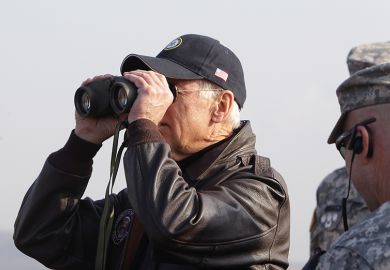University of Arizona researchers are leading an extensive survey of US faculty to quantify the effects of the federal crackdown on research ties to China, part of an escalating uprising against the Trump-era initiative.
Reaching more than 20,000 academics at the nation’s top 50 research universities, the survey hopes to find the dimensions of a problem that so far has been detailed publicly in only a relatively small number of high-profile cases of arrests and firings.
The true impact of the Department of Justice’s so-called China Initiative and its harms and intimidations across higher education could be far greater, said a co-organiser of the survey, Jenny Lee, professor of educational policy studies and practice at Arizona.
“This is an attempt to get a more systematic view, directly from the perspectives, opinions and experiences of scientists themselves,” said Professor Lee, whose research partners include colleagues at the University of Georgia, the University of Texas at Austin, and the University of California, Los Angeles. The study's co-organiser, along with the University of Arizona, was the Committee of 100, a private group that promotes China-US relations.
Professor Lee outlined the effort amid signs of growing impatience with Biden administration silence on the state of the crackdown, especially after revelations of extensive FBI misbehaviour in the first prosecution to reach trial.
In that case, the government failed to win a conviction after an FBI agent admitted fabricating accusations against the Chinese-born defendant, Anming Hu – an associate professor of mechanical, aerospace and biomedical engineering before his post-arrest dismissal from the University of Tennessee – while trying to get him to spy for the US.
Professor Lee outlined her plans from Tucson while Representative Jamie Raskin, back in Washington, gathered a round table of lawmakers, academic leaders and ethnic Chinese scientists caught up in such crackdowns.
Mr Raskin, a Democrat, made clear that the US has a long history of demonising ethnic Chinese and other foreigners, in academia and beyond. As such, he said, the effort initiated in the Trump administration is a revival and escalation of such practices that the Biden administration has not expressly denounced.
The congressman’s event included Xiaoxing Xi, a professor of physics at Temple University, who recalled the early morning in May 2015 when armed FBI agents entered his house near Philadelphia, arrested and handcuffed him, and pointed guns at his wife and teenage daughters.
Professor Xi described being strip-searched in detention, and having his house torn through in a search for evidence. Government officials dropped the case a few months later, after realising that blueprints he had shared with Chinese colleagues were not the militarily sensitive technology they had believed them to be.
They were joined at the event by Steven Chu, professor of physics at Stanford University and former US secretary of energy, and Randy Katz, vice-chancellor for research at the University of California, Berkeley. Both warned about serious danger to US scientific and economic competitiveness if the federal government could not be far more careful and competent in distinguishing real security threats.
“This is the worst thing that we can do for our own selves,” given the rising global competition for scientific talent, Professor Chu said. “We’re not shooting ourselves in the foot – we’re shooting ourselves somewhere very near here,” he said, pointing to his forehead.
Mr Raskin compared the crackdown – arresting researchers for minor paperwork violations in reporting their ties to Chinese partners when the rules for such disclosures aren’t even clear – to the long-standing US police practice of arresting black motorists for a burned-out car lightbulb. Instead of “driving while black”, he said, it amounted to “researching while Chinese American”.
Register to continue
Why register?
- Registration is free and only takes a moment
- Once registered, you can read 3 articles a month
- Sign up for our newsletter
Subscribe
Or subscribe for unlimited access to:
- Unlimited access to news, views, insights & reviews
- Digital editions
- Digital access to THE’s university and college rankings analysis
Already registered or a current subscriber?








